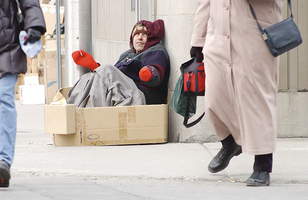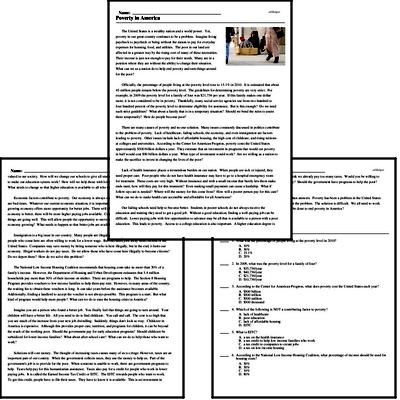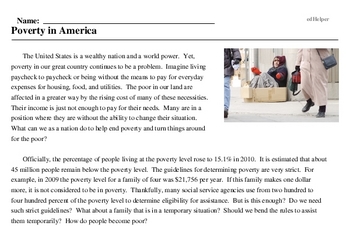Poverty in America
The United States is a wealthy nation and a world power. Yet, poverty in our great country continues to be a problem. Imagine living paycheck to paycheck or being without the means to pay for everyday expenses for housing, food, and utilities. The poor in our land are affected in a greater way by the rising cost of many of these necessities. Their income is just not enough to pay for their needs. Many are in a position where they are without the ability to change their situation. What can we as a nation do to help end poverty and turn things around for the poor?
Officially, the percentage of people living at the poverty level rose to 15.1% in 2010. It is estimated that about 45 million people remain below the poverty level. The guidelines for determining poverty are very strict. For example, in 2009 the poverty level for a family of four was $21,756 per year. If this family makes one dollar more, it is not considered to be in poverty. Thankfully, many social service agencies use from two hundred to four hundred percent of the poverty level to determine eligibility for assistance. But is this enough? Do we need such strict guidelines? What about a family that is in a temporary situation? Should we bend the rules to assist them temporarily? How do people become poor?
There are many causes of poverty and no one solution. Many issues commonly discussed in politics contribute to the problem of poverty. Lack of healthcare, failing schools, the economy, and even immigration are factors leading to poverty. Other issues include lack of affordable housing, the high cost of childcare, and rising tuitions at colleges and universities. According to the Center for American Progress, poverty costs the United States approximately $500 billion dollars a year. They estimate that an investment in programs that would cut poverty in half would cost $90 billion dollars a year. What type of investment would work? Are we willing as a nation to make the sacrifice to invest in changing the lives of the poor?
Lack of health insurance places a tremendous burden on our nation. When people are sick or injured, they need proper care. Poor people who do not have health insurance may have to go to a hospital emergency room for treatment. These costs are very high. Without insurance and with a small income that barely lets them make ends meet, how will they pay for this treatment? Even making small payments can cause a hardship. What if follow-up care is needed? Where will the money for this come from? How will a poorer person pay for this care? What can we do to make health care accessible and affordable for all Americans?




